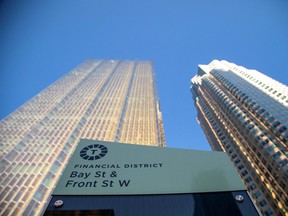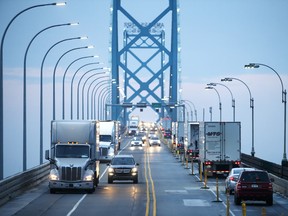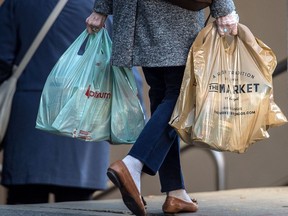Fierce economic comeback has created a build-up of challenges, including inflation levels not seen in three decades
Article content
The National Post and the Canadian Club of Toronto held their 45th annual outlook luncheon virtually on Tuesday. With the country still grappling with the COVID-19 pandemic the economic recovery was front of mind, but some longstanding issues loomed as well, from housing to climate change. This year’s panel included Financial Post editor-in-chief Kevin Carmichael, National Post columnist Matt Gurney, Scotiabank chief economist Jean-François Perrault, Iris Asset Management founder Juliette John and BNN Bloomberg anchor Amanda Lang. Below are some of the highlights:
Advertisement
This advertisement has not loaded yet, but your article continues below.
Article content
The state of Canada, currently
The economic recovery has been stronger than many had expected at the outset of the COVID-19 pandemic. But that fierce comeback has created a build-up of challenges, including inflation levels not seen in three decades, extreme supply constraints, a labour market that can’t fill gaping vacancies and rising house prices.
“It’s important to keep in mind really, behind much of that is simply things are working out way better than we thought,” Perrault said. The global economy has been able to withstand virus-induced shutdowns and has been propped up by government support to businesses and households. “A lot of that is very positive.”
Inflation
The strength of the global recovery has kept the stock market in a good place, one that has John optimistic. “There’s still a great deal of reasons for optimism and a lot of that has to do with healthy corporate balance sheets, the fact that companies are still enjoying a lot of opportunities for some margin expansion, even with some inflationary pressures,” she said.
Advertisement
This advertisement has not loaded yet, but your article continues below.
Article content
Still, the rapid rise in prices has everyone from grocery shoppers to central bankers tugging at their collars. That’s why the Bank of Canada is “hyper-focused” on inflation expectations, said Carmichael. Tiff Macklem and his deputies early last year said the Governing Council would set out to ensure a complete economic recovery, including within the labour market. Now, the “lower for longer” mantra for interest rates has quickly been swept aside as inflation consistently hit above the bank’s target for most of last year. “Then on a dime — almost certainly in terms of central bank thinking — they shifted hard and they shifted because they’re worried about expectations built into the inflation story,” Carmichael said. “It seems to me that the central banks are ready to trigger another recession if they have to.”
Advertisement
This advertisement has not loaded yet, but your article continues below.
Article content
Politics and government
The Canadian government has been battling the COVID-19 crisis for close to two years now and exhaustion, it seems, is taking over, something that could open up doors to political instability, said Gurney. “When Donald Trump was elected president in the United States, that basically zeroed out the federal government’s capacity for crisis management,” he said. “We didn’t really have the capacity to deal with anything else. Crises are coming at us faster and faster now. We have the same general group of people and now they’re more tired.”
Carmichael said increasingly in elections that parties are focusing on maximizing voter efficiency over trying to secure a large voter base. That’s partly why the Liberals won a minority government while the Conservatives came out with more of the popular vote. Add exhaustion to the mix, and it creates a vacuum in which fringe politics can slowly take root, Gurney said.
Advertisement
This advertisement has not loaded yet, but your article continues below.
Article content
Housing
Canada’s housing market activity has soared during the pandemic. The average price for a home hit $720,850 in November, an all-time high. “All of us will agree that there is a policy solution to our housing crisis. And I call it a crisis and it’s an affordability issue,” said Lang. “It goes to the basic human right of shelter… That’s not available to some Canadians. That’s just not okay.” Lang said on many government levels, politicians have to work to create capacity to build more housing, adding that the hot market will eventually recede.
Climate change
Companies are leading the charge on climate change, more so than governments, said Lang, with firms pricing in environmental effects without a global price mechanism created by countries. “At some point, we’ll get some kind of global framework that will be a game-changer and very profitable for some. Remember that we’re letting the BlackRocks of the world decide our future. I don’t know why, but that seems to be what we’re doing. The policy should come from government. I was hopeful for COP26 and nothing really happened there of any kind of great importance.”
Advertisement
This advertisement has not loaded yet, but your article continues below.
‘Way better than we thought’: Economic recovery side effects a hot topic at Post’s annual outlook luncheon
2022-01-05 14:02:21






